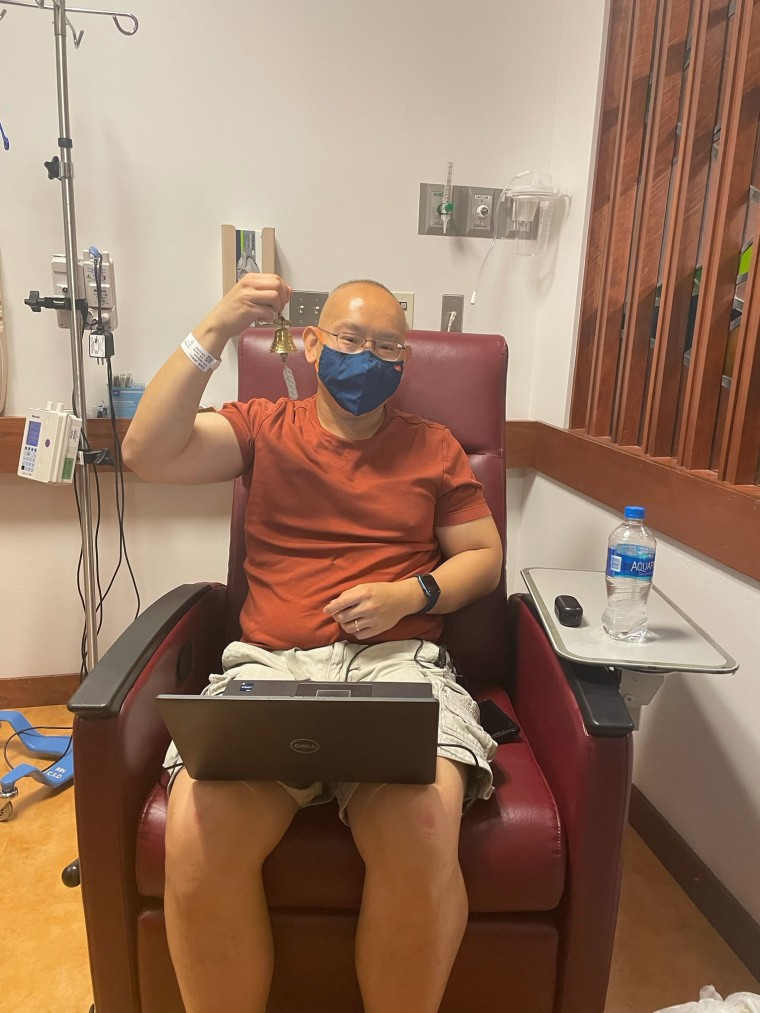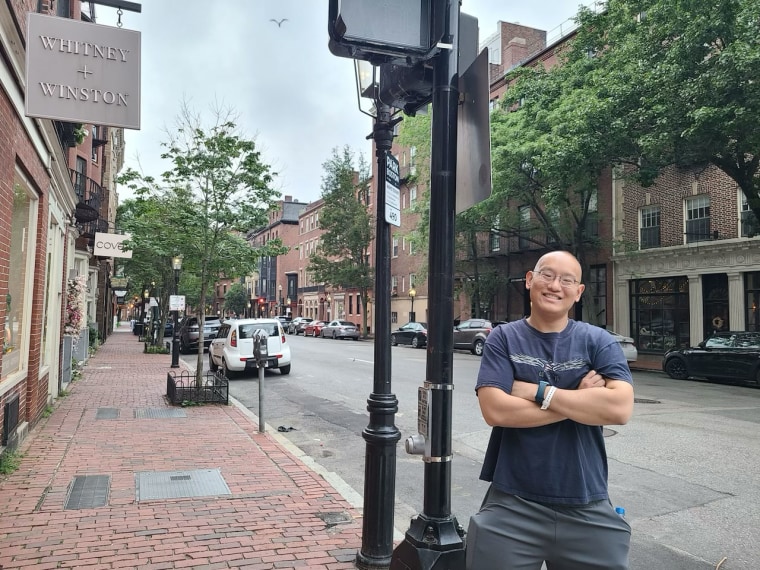Last year, medical student James Shen contracted COVID-19 while working in the emergency room during a rotation. He developed pneumonia and was hospitalized. As part of his care, he underwent a chest X-ray, and doctors discovered something unusual.
“This is probably the rare instance where COVID might have saved someone’s life,” Shen, 31, of Manchester, Connecticut, tells TODAY.com. “When they did the chest X-ray, that’s when they actually found … a large pleural effusion in my chest.”
That pleural effusion, a collection of fluid in the chest, doesn’t normally occur with COVID-19, and more testing revealed that Shen had a large thymoma, a rare type of cancerous tumor starting in the thymus, an organ in the chest that's part of the immune system.
Several doctors thought they’d need to remove his entire right lung — or at least part of it — to treat him. Then he found a doctor that said he could save his lung.
“He told me it was a 17-hour procedure, the longest of a surgery he’s actually ever done on someone,” Shen says.
Medical school and cancer diagnosis
Looking back to the period before he was diagnosed, Shen realizes that he would become more winded than usual when he exercised.
“I realized that for the last couple of years I noticed my exercise tolerance kind of decreased a little bit,” he says. “I also noticed that whenever I tried to hold my breath, I couldn’t hold my breath as long as I used to.”
But he says those symptoms remained so “mild” that they didn’t stop him from being active at the gym, running or participating in medical school rotations.
In March 2023, when he learned he had cancer, he knew it was a rare and challenging diagnosis. Shen understood that his CT scan showed a dramatic spread, which “usually is a poor prognosis.”
The mass sat in his mediastinum, the inside of the chest between the sternum and spinal column with the lungs on either side, and was "very large," Shen says. "(It) was much different than the extent that I was used to seeing (in) the patients I took care of."
His cancer was stage 4, and the large tumor encapsulated his right lung, pushed his heart over and was growing into the diaphragm. It was also in the pleura, a thin membrane that covers the organs in the chest cavity.
“I was obviously quite disheartened by that. A lot of things went through my mind. I was thinking, ‘How much longer am I going to live?’" Shen recalls. “Ignorance is bliss. I wish I didn’t know what I knew).”
Still, his background as a medical and a Ph.D. student — Shen’s earning dual degree — helped him research treatments.
“I was trying to cope with the fact that I had a very advanced, extensive disease,” he says.

He met with various thoracic surgeons, who specialize in diseases and organs in the chest, about surgery. The first doctor said they might need to remove Shen’s lung, so Shen sought a second opinion. That doctor also believed surgery would require removing at least part of Shen’s lung. A third doctor agreed.
Shen had started chemotherapy to try to shrink the tumor, but it wasn’t working yet. One of his doctors recommended that he speak to a radiation oncologist, who specializes in radiation to treat cancer. Shen thought another consultation wouldn't hurt, and that radiation oncologist directed him to Dr. Joseph Friedberg.
“He was the fourth thoracic surgeon that I’ve talked to,” Shen says. “I remember he told me — this was quite drastic — ‘I’m pretty confident we don’t have to take any of your lung.’”
Thymus cancer and treatment
Friedberg says that thymus cancers, which occur in a gland that is mostly dormant in adults, are “pretty rare.”
“The thymus gland is part of your immune system, and it’s biggest and most active when we’re infants, and then it kind of shrivels up,” the thoracic surgeon-in-chief at Temple University Health System tells TODAY.com. “It doesn’t completely disappear.”
There are two types of thymic cancers, a thymoma and thymic carcinoma, he says. Thymomas treatment normally involves simply removing the tumor.
“Thymic carcinomas are, as the name implies, more serious cancers,” Friedberg says. “They’re almost universally going to be worse.”
Shen had a thymoma, typically the less aggressive type. But it had grown so large the mass was “the size of your head,” Friedberg adds.
“It was literally that much cancer,” he continues. “It was occupying the greater part of his right chest. It was squashing his heart and pushing it over. … It was colossal.”
Shen’s cancer had spread to the pleura — which covers the lungs, chest cavity along the ribs, the sac around the heart, the nerves that control the diaphragm, the trachea, the windpipe, the esophagus, the spine, the aorta and the superior vena cava.
It had also started to invade the superior vena cava, meaning there would be a risk of significant bleeding during the surgery.
“There isn’t any part of the chest cavity, when you have a ... tumor like this, that’s not involved with the cancer,” Friedberg says. “My job was to go in and remove all of the detectable disease."
Friedberg also specializes in performing surgery to treat mesothelioma, cancer that originates in the pleura, so that helped him be able to remove Shen's cancer while leaving his lung, when many other surgeons didn't think they could.
It was not easy. The July 2023 surgery lasted 17 hours. Before finishing surgery, Friedberg filled the chest cavity with a mixture of sterile water and iodine to try to treat the “invisible microscopic disease remaining” in the pleura, he says. “I’ve been using it primarily for mesothelioma and gotten some very good results.”
Friedberg adds that he tries as much as possible to treat people’s cancer without taking their lungs as a way of "preserving quality of life."
Friedberg says Shen can continue to do things he enjoys that he might have had to give up had he lost part of his lung.
“He’s back at work and runs and goes to the gym and lifts weights. That’s unbelievable. He’s back to running,” Friedberg says. “Had we taken his lung out, he wouldn’t be doing these things.”
'There's something afterwards'
Recovering from surgery felt physically and emotionally tough for Shen. He was intubated for five days and spent another two weeks in the intensive care unit with five chest tubes snaking out of him.
“That’s quite painful, and it’s hard to carry those chest tubes around and walk,” he says. “It was quite depressing actually ... seeing what I had gone through and feeling so bad after the surgery. I remember I was debating whether or not life was still worth living.”
Despite the experience being “quite traumatic,” Shen began accept that recovery would be difficult and slowly began the process. The experience gave him more insight into what it is like being a patient.
“It’s quite interesting being able to be on the other side of things,” Shen says. “It definitely makes you feel more empathy for the patient.”
When Shen returned home, he did physical and occupational therapy and walking. He also received radiation for six weeks as part of a clinical trial for patients with cancer in the pleura.
“I was able to get through it without any complications,” he says.
A recent scan showed that Shen has no evidence of disease, though thymomas can recur in patients at any time.
“You could call them annoying in the fact that they can recur and occur many, many years later,” he says. “I’m probably going to be getting CT scans and MRIs for the rest of my life.”
Shen will be pursuing radiation oncology in his residency training. While he isn’t in the habit of sharing too much about himself with patients, he recently encountered a patient who learned she had cancer spread throughout her abdominal cavity.
“She was very distressed and very depressed,” he says. “I told her, ‘Hey I know what it’s like being in the emergency room and being told you have very advanced cancer because I’ve been through it as well. The best that you can do is just listen to your oncologist.’”
Having cancer also changed the path of his career. Shen thought he’d be a physician scientist and do research primarily while seeing patients only sometimes. But he now knows he wants to focus mostly on patient care.
“(Having cancer) affected the way I approach life,” Shen says. “It really made me realize that my goals in life were different than what I imagined.”
Shen wants his story to be hopeful for anyone with a tricky diagnosis.
“It’s important to realize that if you’ve had a major challenge in your life, just (don’t) lose hope,” he says. “There’s something afterwards.”
